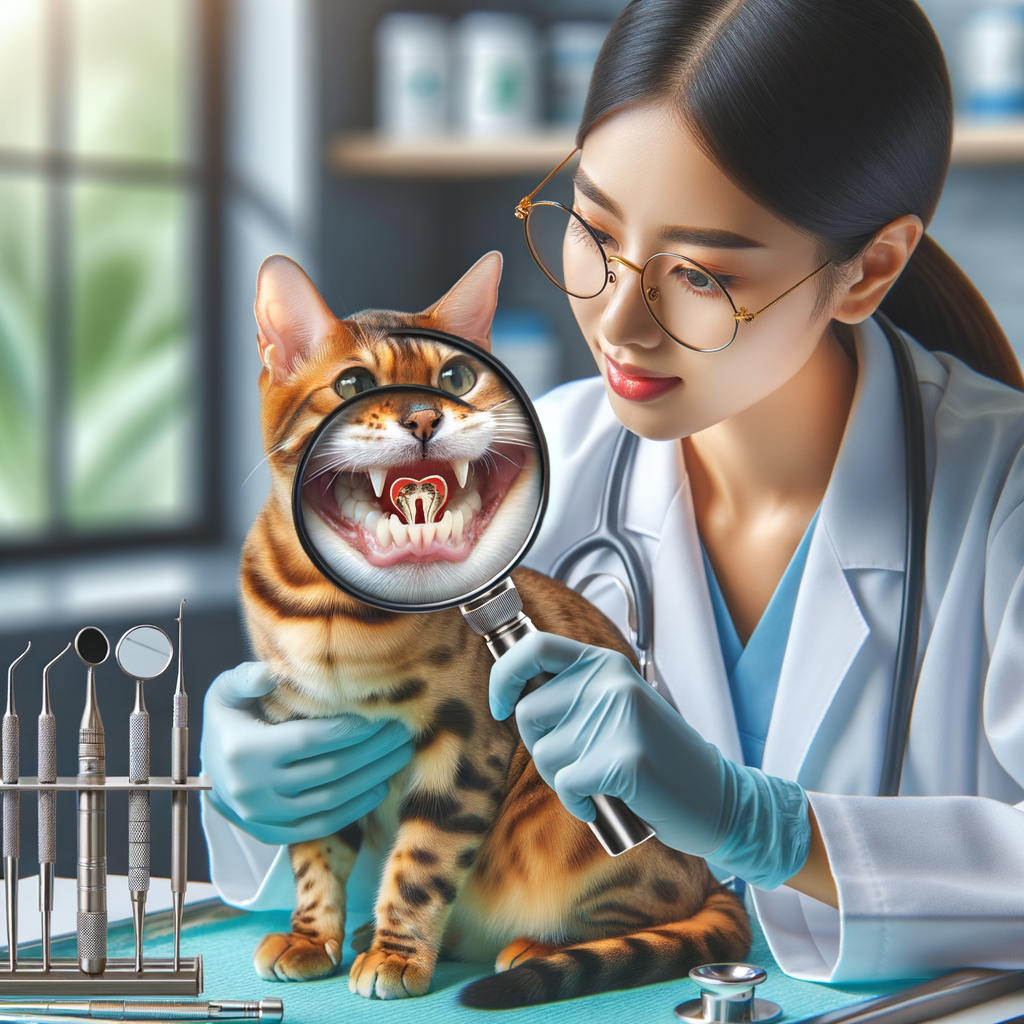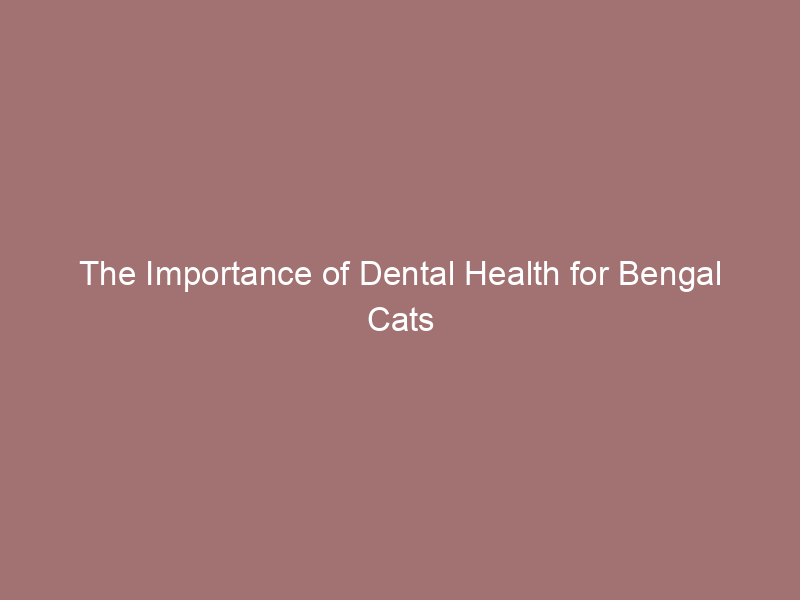
Introduction to Bengal Cat Dental Health
- Overview of the importance of dental health for Bengal cats: Good dental care helps them eat properly and stay healthy. Just like humans, cats can suffer from dental issues that can lead to pain and other health problems.
- Common dental issues in Bengal cats: Bengal cats can face several dental problems. These include plaque buildup, gingivitis, and tooth decay. Plaque is a sticky film that forms on teeth. If not cleaned, it can harden into tartar. Gingivitis is an inflammation of the gums, and tooth decay can cause severe pain and infections.
Dental Care for Bengal Cats
Regular Bengal Cat Teeth Cleaning
- Importance of regular teeth cleaningIt helps prevent plaque buildup and gum disease. Healthy teeth can also prevent bad breath and other health issues.
- Step by step guide to Bengal cat teeth cleaningCleaning your Bengal cat’s teeth can be easy if you follow these steps:
- Gather Supplies: You will need a cat toothbrush and cat-safe toothpaste.
- Get Your Cat Comfortable: Hold your cat gently but firmly. Make sure they feel safe.
- Introduce the Toothbrush: Let your cat sniff and lick the toothbrush first.
- Apply Toothpaste: Put a small amount of cat-safe toothpaste on the brush.
- Brush Gently: Brush in small circles, focusing on the gum line. Be gentle and patient.
- Reward Your Cat: Give your cat a treat or extra affection after brushing.
Regular brushing can keep your Bengal cat’s teeth healthy and strong.
Oral Hygiene for Bengal Cats
-
Best practices for maintaining oral hygiene
- Brush their teeth regularly. Aim for at least twice a week.
- Use a cat-friendly toothbrush and toothpaste. Never use human toothpaste.
- Provide dental treats that help reduce plaque and tartar.
- Offer chew toys that promote dental health.
- Ensure they have a balanced diet. Good nutrition supports oral health.
-
Recommended dental products for Bengal cats
Here are some products that can help maintain your Bengal cat’s dental health:
Product Description Cat Toothbrush Specially designed for cats, with soft bristles. Cat Toothpaste Flavored toothpaste that is safe for cats to swallow. Dental Treats Treats that help clean teeth and freshen breath. Chew Toys Toys that help reduce plaque and tartar buildup. Water Additives Liquids added to water to help control plaque.
Preventing Dental Disease in Bengal Cats
Bengal Cat Gum Disease
- Bengal Cat Gum Disease
Gum disease, also known as periodontal disease, is common in Bengal cats. It starts with plaque buildup on the teeth. If not cleaned, this plaque hardens into tartar, leading to gum inflammation.
Signs of gum disease include:
-
- Red or swollen gums
- Bad breath
- Bleeding gums
- Difficulty eating
-
Prevention and Treatment Options
- Brush Their Teeth: Use a cat-friendly toothbrush and toothpaste. Brush their teeth at least twice a week.
- Provide Dental Treats: Dental treats can help reduce plaque and tartar buildup.
- Regular Vet Visits: Schedule dental checkups with your vet. They can professionally clean your cat’s teeth.
If your Bengal cat already has gum disease, treatment options include:
-
- Professional Cleaning: Your vet will remove plaque and tartar.
- Antibiotics: In severe cases, antibiotics may be needed to treat infection.
- Home Care: Continue brushing and providing dental treats to maintain oral health.
Bengal Cat Tooth Decay Prevention
- Causes of tooth decay in Bengal catsTooth decay in Bengal cats can be caused by several factors. One main cause is poor dental hygiene. If their teeth are not cleaned regularly, plaque can build up. Plaque is a sticky film of bacteria that can lead to cavities. Another cause is diet. Cats that eat a lot of soft or sugary foods are more likely to get tooth decay. Genetics can also play a role. Some Bengal cats may be more prone to dental issues because of their genes.
- Effective prevention strategiesPreventing tooth decay in Bengal cats involves several steps. Use a toothbrush and toothpaste made for cats. Provide a balanced diet. Dry cat food can help scrape off plaque from their teeth. Offer dental treats and toys. These can help clean their teeth as they chew. Your vet can spot early signs of tooth decay and treat them before they become serious.
Dental Checkups for Bengal Cats
- Importance of Regular Dental Checkups
These checkups help keep their teeth and gums healthy. Just like humans, cats can get dental problems. If not treated, these problems can cause pain and other health issues.
According to experts, about 70% of cats show signs of dental disease by the age of three. Regular checkups can help catch these problems early. This way, your Bengal cat can stay happy and healthy.
- What to Expect During a Dental Checkup
During a dental checkup, the vet will look at your cat’s teeth and gums. They will check for signs of plaque, tartar, and gum disease. The vet might also take X-rays to see if there are any problems below the gum line.
Here is a table that shows what happens during a dental checkup:
| Step | Description |
|---|---|
| 1. Visual Exam | The vet looks at the teeth and gums. |
| 2. Cleaning | The vet removes plaque and tartar. |
| 3. X-rays | Images are taken to check under the gums. |
| 4. Treatment | Any dental issues are treated. |
After the checkup, the vet will give you tips on how to care for your cat’s teeth at home. This might include brushing their teeth or using special dental treats.
Regular dental checkups are key to keeping your Bengal cat’s mouth healthy. Make sure to schedule these checkups at least once a year.
Maintaining Bengal Cat Oral Health
Diet and Bengal Cat Oral Health
- Role of diet in oral health:The right food can help prevent plaque buildup and keep their teeth strong. Foods that are too soft can stick to their teeth, leading to decay and gum disease. Crunchy foods, on the other hand, can help clean their teeth as they chew.
- Recommended diet for healthy teeth and gums:For healthy teeth and gums, it is recommended to feed Bengal cats a balanced diet that includes both dry and wet food. Dry kibble can help scrape off plaque, while wet food provides essential nutrients. Additionally, incorporating dental treats designed to reduce plaque and tartar can be beneficial. Always ensure fresh water is available to help wash away food particles.
| Food Type | Benefits |
|---|---|
| Dry Kibble | Helps scrape off plaque and tartar |
| Wet Food | Provides essential nutrients and moisture |
| Dental Treats | Reduces plaque and tartar buildup |
Exercise and Bengal Cat Oral Health
- Impact of exercise on oral health
Exercise is not just good for your Bengal cat’s body; it also helps their oral health. When cats play and chew on toys, it can help clean their teeth. This reduces plaque and tartar buildup. Active cats are less likely to have dental problems.
-
Exercise tips for Bengal cats
- Interactive Toys: Use toys that make your cat chase and pounce. This helps keep their teeth clean.
- Climbing Trees: Cat trees encourage climbing and jumping, which is great exercise.
- Laser Pointers: Laser pointers can get your cat moving and help with their dental health.
- Playtime: Spend at least 15 minutes a day playing with your cat. This keeps them active and healthy.
The Importance of Dental Health for Bengal Cats
- Recap of the importance of dental health:Healthy teeth and gums help them eat well and stay active. Poor dental health can lead to pain, infections, and other serious health problems.
- Final thoughts and recommendations:Brush your Bengal cat’s teeth often and provide dental treats. Visit the vet for checkups. A little effort can keep your Bengal cat happy and healthy.






